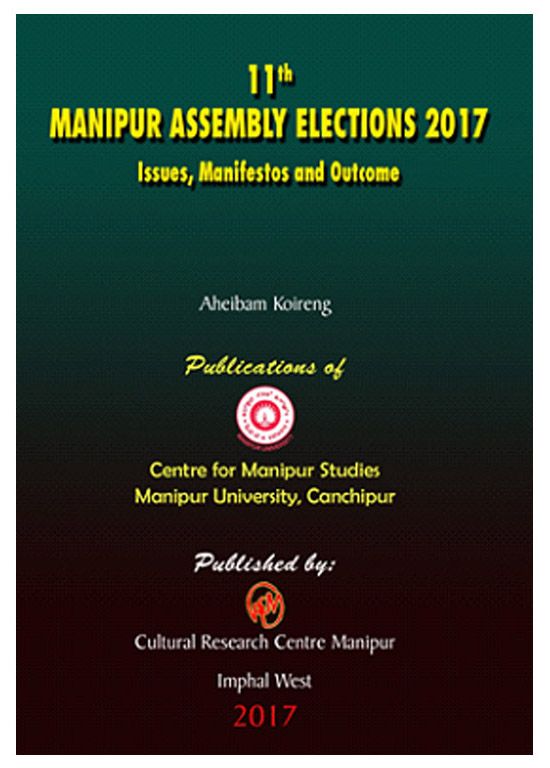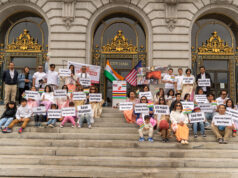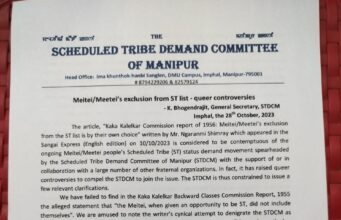Authored by: Aheibam Koireng Singh
First Edition 2017, ISBN 978–93–83201–303, Pp. x+ 123
Price: Rs. 650 (Hardbound); Rs. 450 (Paperback)
Publications of Centre for Manipur Studies, Manipur University
Published by: Cultural Research Centre Manipur
The 11th Manipur Assembly Elections (MAE) 2017 was held in two phases correspondingly on 4th and 8th March 2017 under tight security. Repolls for both the phases were also later held on the basis of reports and complaints of the voting process getting interrupted due to technical snags and other malpractices during elections. Ahead of the election, arrangements were made for the 2,228 underground cadres belonging to various militant groups who were under Suspension of Operation (SoO) and Memorandum of Understanding (MoU) with the Government of India (GoI) to cast their votes through postal ballot at 14 designated camps across the State. For the first time, two polling stations of Ukhrul Assembly Constituency (AC) were exclusively manned by women officials. The overall voter turnout for the state elections had been recorded at 86.61 Per Cent (PC).
The self-sworn affidavits of the candidates themselves in the fray reveals their financial details, criminal background, age and educational profile. Of all the 167 candidates in the first phase, 54 were Crorepatis – 21 each from Indian National Congress (INC) and Bharatiya Janata Party (BJP), five from National Peoples’ Party (NPP), two each from North East India Development Party and Nationalist Congress Party (NCP). There were three candidates who have declared serious criminal cases, including cases related to attempt to murder, cheating and dishonestly inducing delivery of property etc. Four candidates from BJP, two from INC, one each from Manipur National Democratic Front (MNDF) and NCP were also found to have declared criminal cases against them. 38 were between 5th pass and 12th, while 124 were graduate and above. In the second phase elections, there were 29 Crorepati candidates, the Congress topping the list with 10, followed by BJP with 08, five from Naga Peoples Front (NPF), one each from NPP and MNDF and two from among the independent candidates. 24 have declared their qualification to be between 5th pass and 12th pass, while 72 have a qualification of graduate and above. One candidate has declared himself as just literate.
Undoubtingly Economic Blockade was the most pressing issue as the elections were held while the blockade was ongoing. It was a follow on of the total shut down called by the UNC against the decision of the state government to upgrade Sadar Hills and Jiribam to full-fledged districts and ‘against State sponsored terrorism by the communal Government of Manipur (GoM)’. In the electioneering of 11th MAE 2017, the two principal contending parties, the BJP and the INC have obviously the most highly pitched battle on the issue of economic blockade. The BJP used the UNC’s ongoing indefinite economic blockade of national highways in Manipur, to target the INC and incumbent Chief Minister Okram Ibobi. The INC counter-alleged the UNC’s ongoing indefinite economic blockade as being instigated by BJP and imposed at their behest. Creation of Seven New Districts, on ‘8 December 2016’ happened when economic blockade was afoot. The GoM maintained that the creation of new districts was done so to facilitate better administration and more equitable development, whereas the UNC opposed as it was a setback to their demand for alternative arrangement outside the GoM and goes against their dictate of ‘severing all political ties with the GoM. This bold move of creation of seven new districts by the Ruling INC government was considered a political masterstroke which would uplift the otherwise sagging image and other anti-incumbency factors. This led the UNC to harden its ongoing indefinite economic blockade. Talks with the UNC and the GoM involving the GoI also did not resulted to any significant breakthrough. UNC later issued a stricture implying that INC would be boycotted. UNC also made its position known stating that all the Nagas in Manipur would face the Assembly election with the NPF as the bandwagon. Many thought this stricture issued by UNC could blanked out INC candidates in the ‘Naga areas’. But INC candidates comfortably got elected from the Naga majority ACs of Tengnoupal, Ukhrul, Karong, and Nungba.
On 3rd March 2017, a day ahead of the First Phase elections to be held, the Manipur High Court had declared the more than four months old economic blockade of UNC as illegal and accordingly directed all authorities concerned of the GoM and the GoI to ensure smooth vehicular traffic over NH-37 as well as NH-2 immediately. Of the two ‘Kuki’ and ‘Zomi’ armed conglomerate groups, KNO was supportive of INC for creating new district in Kuki areas and the UPF was in favour of BJP for the continuation of their ‘political talk’. Their support was pertinent as more often than not they determined the electoral outcomes in the areas where they have their presence. The Framework Agreement signed between the GoI and National Socialist Council of Nagalim- IsaacMuivah (NSCN-IM), a faction of the Naga armed group on 3rd August 2015 raises strong apprehension in Manipur that it would lead to dismembering sizeable chunk of Manipur’s territory and disturb the state boundary. The apprehension is valid as NSCN-IM have still not abandoned its aspiration for ‘Nagalim’, and the previous BJP government at the Centre on 14th June 2001 agreed to extend the Ceasefire with the NSCN-IM without territorial limits, the subsequent outcome of which literally burned Manipur and led to the sacrifice of 18 civilian lives. All Manipur Students’ Union (AMSU), Committee of Civil Societies Kangleipak (CCSK) and the United Committee Manipur (UCM) also demanded to disclose the contents of the Framework Agreement.
The CCSK and the UCM organized a convention on 27 February appealing all the candidates of MAE 2017 to come forward to solemnly swear and affirm the draft ‘Pledge to the People’ stating that they shall – spare no efforts in urging the GoI to bring out a White Paper on the Framework of Agreement to enable the people of Manipur to form an informed opinion on the same; oppose tooth and nail any attempt to create a homeland dedicated to one ethnic community; stand with the people unreservedly in rejecting any supra-state body to buy peace with NSCN-IM. Further it also stated that, after getting elected, they shall do – everything in my power to have a resolution fully endorsing the above demands adopted by the 11th State Legislative Assembly; and everything in my power to protect, preserve and promote the territorial integrity and age-old tradition of co-existence amongst all communities of Manipur. On the said day, as reported, 26 BJP candidates, 14 Congress candidates, 10 NEIDP candidates, eight AITC candidates, six CPI candidates, five MPP candidates, four NCP candidates, three PRJA candidates, three NPP candidates, two All India Forward Bloc (AIFB) candidates, two Communist Party of India-Marxist (CPI-M) candidates, two Lok Janshakti Party (LJP) candidates and three Manipur National Democratic Front (MNDF) candidates have endorsed the pledge by appending their signature.
INC leaders alleged the BJP government at the centre for bypassing the Chief Minister and the people of Manipur while signing the framework agreement. INC dared the BJP to reveal the contents of the agreement if it doesn’t have any clause which could hurt the state territorial integrity as assured by central BJP leadership including Prime Minister, Modi, and Union Home Minister, Rajnath Singh. The BJP alleged the ruling INC party of playing politics on it for enhancing electoral prospects. The Kukis represented by Kuki Inpi also submitted a memorandum to PM Narendra Modi appealing to settle the alleged ‘heinous acts’ committed by NSCN-IM and also to reveal the contents of the Framework Agreement.
Violence erupted in CCPur District after the three bills for the protection of Manipur people were passed in the floor of the Manipur State legislative Assembly (MSLA) without any debate on 31st August 2015. With the said three bills being introduced in the MSLA, printed rumours in Manipuri and local tribal dialect containing 10 points, labelling it as the ‘Meitei JCILPS Bill’ started circulating in the vicinity of the District Headquarter area of CCPur. Its contents are here reproduced in free English translation: 1. Howsoever rich you are, you could not buy even a piece of land in Meitei land; 2. Any business enterprise could no longer be taken up (Shop & Estd. Act); 3. Would no longer have the advantage of getting State Government employment; 4. Our sons and daughter would not get admission in MBBS/Engineering and other professional course; 5. We would not be allowed to buy land even in Lamka which we took pride as our own; 6. Our students would no longer get Tribal fellowship; 7. Whatever benefits we so far got from the government would no longer be available; 8. Those tribes who possessed land at Imphal and other valley area would face immense hardship. Many of them would be dispossessed from the land they bought and settle; 9. The Land for which we took pride for possessing ‘pucca patta’ would no longer be hill areas. Government would have the power to forfeit it by enacting any laws; and 10. Various documents would be asked to produce to just prove that ‘we are natives of Manipur not outsiders’. Your sons would no longer get the admission if you could not produce the approved referral documents. One among the said referral Documents: Where did your forefathers inhabit before 1951? Even if it’s in Manipur, could you produce relevant documents to prove it? Even if you produce, did it either existed in or matched with Government records? You become ‘outside’ when you lacked any of these. If you are outsider…. “from where?”
The Bill mired into controversy, not primarily because of its contents but mainly, by labelling it as anti-tribal, an opportune moment was crafted out of the situation to push the polarised ethnic agendas. The otherwise innocent people were deliberately mobilised and incited against the bill to spark the already highly charged atmosphere. When the first day casualties of anti Inner Line Permit System (ILPS) agitation which happened in the intervening night of 31st August 2016 were reported, six houses belonging to local MLAs and Ministers of the district were set ablazed. Seven including six protestors were killed on the spot, four in firing by security forces, two charred by the arson fire, and one died due to road accident. Of all the six died due to bullet wounds only the two killed on 1st September 2015 were certain to have died of police bullets. But those masterminding the Anti-ILPS protest deliberately projected as if all the nine death casualties were due to police firing. UNC led Naga cohorts including the NPF found the opportune moment to exhibit solidarity with the Anti-ILP Bills protestor from the Kuki-Zomi Community in CCPur.
The continuing agitation and the refusal to give a ceremonial burial to those 09 killed even after the prospects of bill becoming an act was ruled out with the President of India withholding his assent on 11 May 2016 exposed the intention of those sticking to protest. Seeing the over enthusiasm of the UNC, Kukis and Hmars have eventually declared the severing of ties with the Joint Action Committee Against Anti Tribal Bill (JACAATB) just ahead of observing the second anniversary of the Anti-ILP protest. Later, JACAATB constitutes only of the UNC, other Naga frontals and CCPur based organisations belonging to the communities which were traditionally ally of UNC. The JACAATB had made a five-point declaration pertaining to the 11th MAE 2017. The declarations, among others, included refraining from casting their votes in favour of the boycotted tribal MLAs. The stricture against the INC candidate by the JACAATB led to the abandoning of the party by three sitting MLAs in Churachandpur District. SoO was signed at Delhi on 22 August 2008 with the ‘Kuki’ and ‘Zomi’ armed groups namely, the Kuki National Organisation (KNO) and the United People’s Front (UPF), and the GoM and the GoI. After remaining lull for more than 10 years, the GoI initiated the first ever political dialogue with the UPF and the KNO. The UPF, together with the KNO together controls about 10 Assembly segments in the hills. In the last Lok Sabha Elections 2014 for the Outer Manipur Parliamentary Constituency both UPF and KNO took separate decisions to support the INC Candidate. Accordingly, they took up measures to ensure victory of the INC and their efforts bore fruit. Together with the creation of new districts, the ongoing political dialogue with the centre on Kuki-Zomi political issues was also a vital determinant factor which could influence the outcome of the MAE 2017 in the areas controlled by the respective armed conglomerate groups of the KNO and the UPF.
Results were declared on 11th March 2017. INC won most number of seats with 28, followed by the BJP with 21. NPP and NPF also respectively won four seats each and AITC, LJP, and an independent also won a single seat each. A hung verdict followed with neither the INC nor the BJP getting absolute. CM, O. Ibobi Singh, as advised by the Governor resigned on 14 March 2017. On the other hand, N. Biren had been unanimously elected as the leader of the BJP Legislature Party and also declared as their Chief Ministerial candidate. The BJP staked to form a government at the strength of having the support of 32 MLAs. The Governor, on 14th March invited the BJP led coalition to form the government. Accordingly, N. Biren Singh, was sworn in as Chief Minister on 15 March and later won the floor test on 20th March, thereby ending the 15 years of INC rule in Manipur.
After Goa, Manipur became the second state among the five where, despite not being the single largest party in the assembly election of the respective state, forms a Government by forging a post poll alliance. And the 139 days old economic blockade imposed by the UNC was lifted with effect from the midnight of Sunday, 19th March following the tripartite talks involving the State Government, Central Government and the UNC.
[Note: The manifestos of all the contesting parties are also reproduced either in whole or part]












